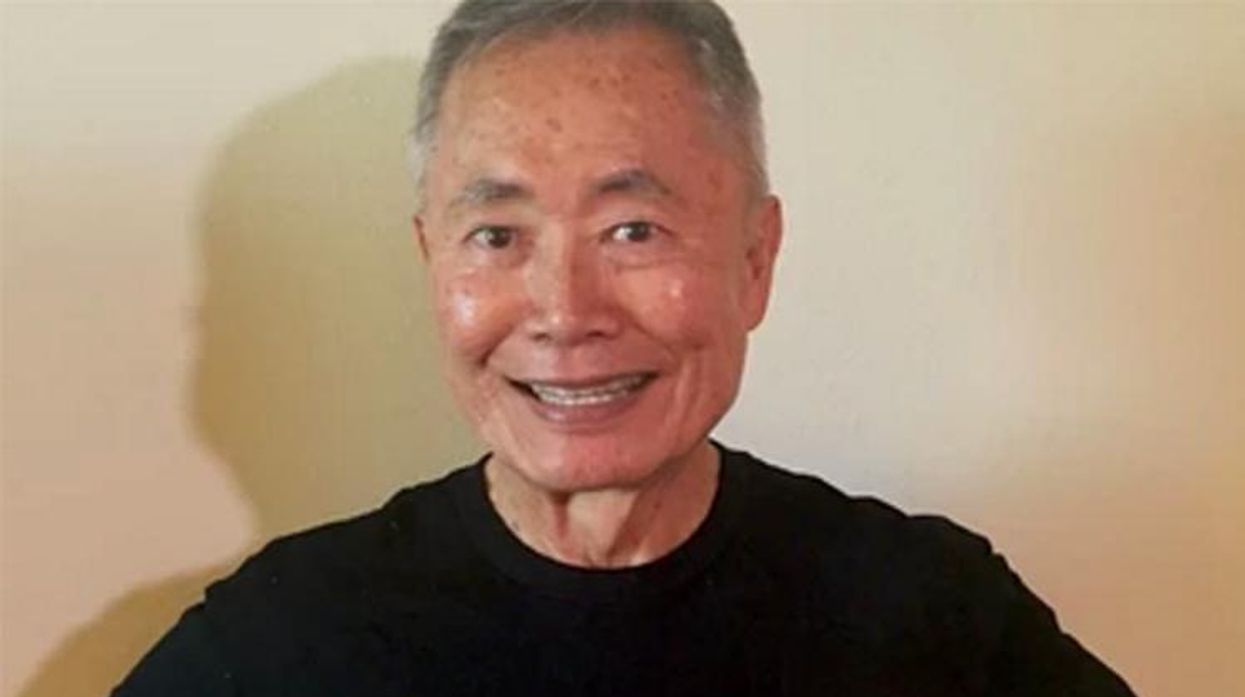Out actor George Takei is taking on North Carolina's anti-LGBT law known as House Bill 2 by releasing a T-shirt that takes aim at the transphobic "bathroom bill," which (among other injustices) bars trans residents from using the bathroom that corresponds with their gender identity in public schools and government buildings.
In a Facebook Live video posted this morning, the actor best known for playing Hikaru Sulu interviews two transgender people -- a woman who identifies herself as Dana, and a man who identifies himself as Lane.
Wearing a black T-shirt that says "You Can Pee Next to Me," Takei interviews Dana and Lane about their childhoods, how they came out to their families, and what their day-to-day existence looks like now that they're able to live authentically.
Even in kindergarten, Dana says, she was already aware that she was "different," and had been ostracized by her peers. The Long Island native shared a story of when her parents wouldn't allow her to dress as Pocahontas for Halloween, though she eventually convinced them to let her dress up as the famed Native American's father, which meant she could still wear the long wig she had hoped to.
"It was less about shaming my gender identity at that age, and it was more about concerns that I would be bullied, or targeted," Dana says. "Which I already was, a target for both."
Dana says she came out as gay at age 11, because she knew she was attracted to boys, and she "just assumed all gay men wanted to be women." She eventually came out as trans to her parents, who struggled to accept her at first but are now proud parents of a transgender daughter, she says.
Lane echoes Dana's sentiment of feeling "different" from an early age in his small hometown in Connecticut.
"But I was always so strange that I didn't necessarily understand that it was about gender," Lane says. "I knew that I didn't fit in with the girls, but I also didn't really fit in with the boys."
Lane relates a story from his preschool days, wheb the Italian Catholic nuns at his school asked him what he wanted to be when he grew up.
"I said [I wanted to be] a fireman with a brown mustache," Lane recalls. "And they all laughed hysterically. ... Because here was this little girl, with this long hair and a dress, saying she wanted a mustache."
Noting that he had long been a "tomboy," Lane says his parents were unfazed when he initially came out as a lesbian in eighth grade. His peers, however, were intent on making him a "spectacle," and he was severely bullied. He didn't tell his parents about the harassment he endured at school until years later.
"I thought I could put off transitioning until after college," Lane says. "Which is laughable, because here I was at 16 like, no, I've got to do it now."
About a year later, Lane came out to his parents as trans, expecting a warm reception, similar to when he came out as a lesbian. But that wasn't the case.
"It did not go well," Lane says. "It was really hard for a while there. ... They had trouble understanding it and thought it was a phase or that I wasn't sure, but their biggest concern was that I was going to be a target, and that I would be bullied, and that I would never find anybody who would love me for who I was, that it would affect my career."
Lane has since been volunteering at LGBT and HIV service organizations, and he hopes to go on to be a "professional queer," ultimately becoming a licensed clinical social worker and gender therapist who works to support trans youth.
Takei closes the video with a brief summary of the North Carolina law, explaining that "the issue was manufactured by right-wing politicians.
Takei is no stranger to calling attention to issues of LGBT equality through social media -- often doing so with puns, quips, and his trademark catchphrase, "Oh my!" In February he posted a parody video aimed at the anti-LGBT Westboro Baptist Church that channeled the hit song "Let It Go" from Disney's animated blockbuster Frozen. He's also responsible for pun-filled statements of affirmation that have been floating around the internet since at least 2014, declaring "It's OK to be Takei."
The shirt Takei wears in the video can be purchased through Omaze for $25, and sales benefit LGBT organization Equality North Carolina.
Watch Takei interview Dana and Lane below.
















